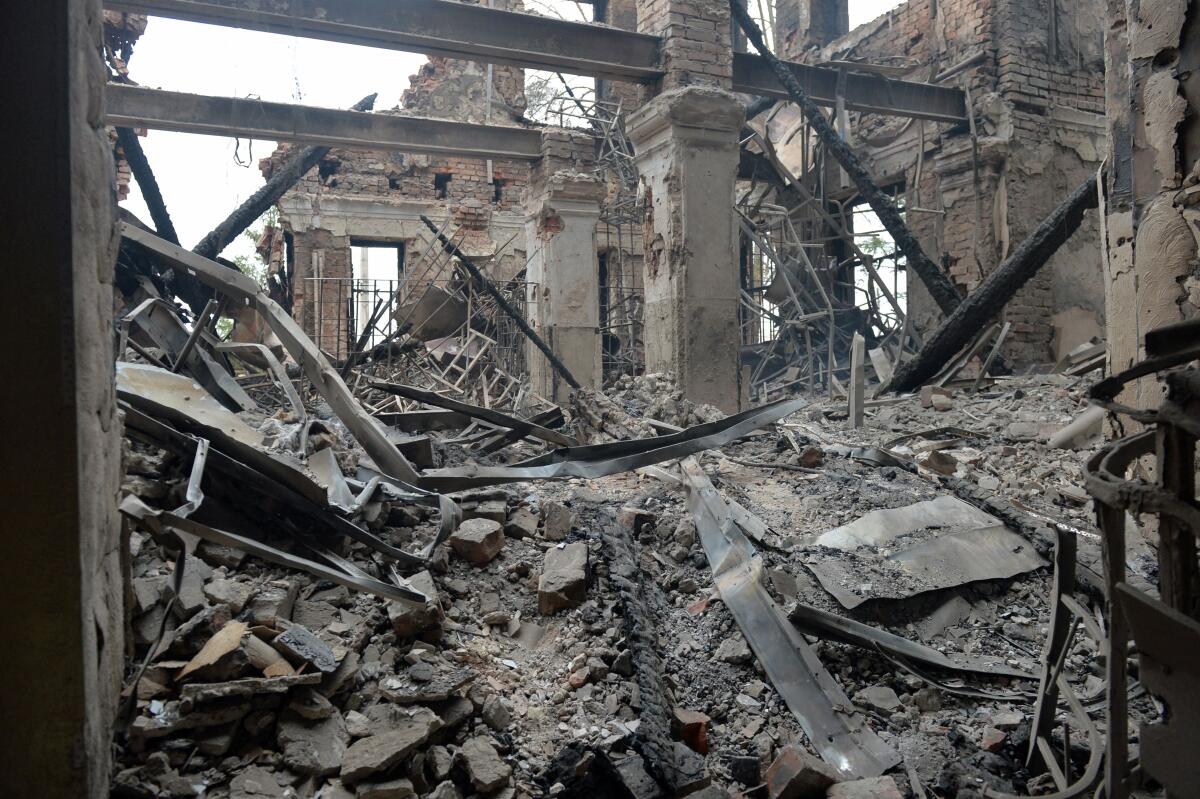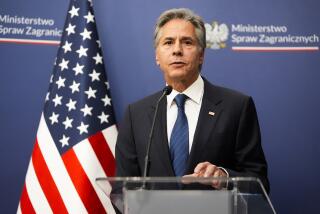The Kremlin is cracking down on truth

- Share via
As Russia’s invasion of Ukraine escalates, the Kremlin is fighting off another perceived threat at home: the truth about the war. With the casualty count mounting in Ukraine, President Vladimir Putin is trying to keep the public in the dark.
Russia is on the path to becoming an even more repressive dictatorship than it has been since the fall of the Soviet Union. This week, what little independent media existed before has been quickly disappearing as the Kremlin has significantly ramped up censorship. Roskomnadzor, Russia’s communications and media authority, blocked access to Facebook, Twitter and almost all major independent and foreign news outlets. The Kremlin doubled down on Friday by making the spreading of “fake news” about the war — news that challenges the Kremlin’s narrative — punishable by up to 15 years in prison.
Many Russia-based news agencies have halted coverage for fear of journalists facing arrest, including prominent independent news outlets such as Dozhd and Ekho Moskvy. Novaya Gazeta and the Bell also removed their content about the war. BBC and Bloomberg journalists based in Russia have stopped working. The Kremlin has similarly intensified its clampdown on opposition activity, quickly arresting anyone who protests against the war.
People clamored to board trains, fled on foot and navigated a river Friday to escape Irpin, Ukraine, as Russian forces continued their advance toward the capital, Kyiv.
The dominant state media depicts Russia’s involvement in Ukraine as a “special military operation” aimed at demilitarizing and “de-Nazifying” the regime in Kyiv and defending persecuted Russian speakers in the Donbas region. Ukraine and the West are presented as the aggressors.
Until this week, Russia’s internet had remained relatively free compared to some other authoritarian regimes, even as the state had constricted the independent press over the last three years by expanding a law on so-called foreign agents.
But even with the Kremlin cracking down on real news, independent journalists and citizens are fighting to access and share information about the war. Some Russians — especially young, well-educated urbanites — had already abandoned state media for its bias and lack of accountability. The internet had provided them with alternative information sources to counter the state propaganda.
A few online independent news outlets are continuing to publish content on what’s unfolding in Ukraine. While only a small number of outlets, such as Mediazona, have evaded censorship from Roskomnadzor, those that are blocked can be accessed using VPN software.
For now, YouTube and Telegram are still able to provide access to content made by independent outlets, including those with blocked websites. Social media personalities such as Yury Dud, whose YouTube channel has almost 10 million subscribers, can wield enormous power in shaping their audiences’ understanding of current events.
Dud has publicly condemned the war in Ukraine, despite efforts trying to label him a foreign agent. Other social media personalities and celebrities have criticized the war as well.
Last year, only 6% of Russians reported using the messaging service Telegram as a main source of news. Its importance may be growing with the Putin government suppressing other means of accessing independent media.
On Telegram, users can subscribe to specific public channels of interest, including those run by news outlets, journalists and personalities. Amid government restrictions, independent news outlets such as Meduza are using Telegram as a tool for sharing news, including about Ukraine and various social controls in Russia. Other channels that focus primarily on soft news have now devoted significant attention to the situation in Ukraine.
The trade fallout of the Russia-Ukraine conflict hugely implicates the global food system.
Social media and Telegram, of course, are themselves vulnerable to misinformation and propaganda. Telegram’s founder, Pavel Durov, considered blocking access to Ukraine content in light of these concerns. He reversed course after facing a backlash. Social media companies have also faced intense pressure to deal with Ukraine war misinformation on their platforms.
While combatting misinformation is critical, we also need to recognize the danger of losing access to these platforms. Without them, Russians will be getting very limited information about the war raging in Ukraine beyond what state television reports.
Some independent news outlets had already started informing their readers about how to use VPNs, newsletters and Telegram to access content if the website is blocked. Ensuring that Russians know about and have ready access to VPN software will be critical in these efforts. And social media companies should use algorithmic amplification or other tools to improve access to high-quality independent news outlets.
With domestic news outlets in Russia being forced to stop their coverage, it’s even more critical that foreign news outlets find ways to serve Russian audiences. The BBC, for example, has begun using shortwave radio to reach people in Russia. These kinds of efforts should be expanded.
Despite a media environment dominated by pro-Kremlin propaganda, there are still journalists working to tell ordinary Russians the truth about the war, and there are Russians who want to learn the reality of what is happening.
Ashley Blum is a PhD candidate in political science researching media and public opinion in Russia at UCLA.
More to Read
A cure for the common opinion
Get thought-provoking perspectives with our weekly newsletter.
You may occasionally receive promotional content from the Los Angeles Times.











